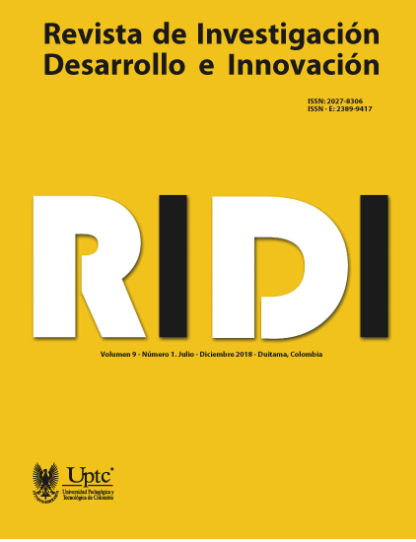Work on mathematical problem solving and its effect on the beliefs of high school students

Abstract
This paper shows some contributions based on the study of the beliefs that students of basic education have about mathematics and the way in which they can be transformed. Basically, the research was aimed at determining whether a pedagogical proposal based on the theoretical framework of problem solving had an impact on the beliefs of a specific group among the different seventh grade groups. The study was developed under a quantitative approach and the instrument designed and validated by Vizcaíno, Manzano and Casas (2015) was used. This instrument allowed to know the beliefs of the students before and after the intervention, associated to four factors that describe them as naïve or sophisticated. Correlations between final beliefs and participants' gender and academic performance were also analyzed. As part of the results it was determined that after working in problem solving, beliefs related to the speed of learning improved, students were more aware of the importance of making an effort and not giving up if they cannot solve a problem immediately.
Keywords
beliefs; epistemology; problem solving; academic achievement; learning of mathematics.
Author Biography
Grace Judith Vesga-Bravo
Matemática, Doctora en Educación Matemática.
Rubén Esteban Escobar-Sánchez
Licenciado en Matemáticas, Magíster en Educación Matemática.
References
- Callejo, M. L., & Vila, A. (2003). Origen y formación de creencias sobre la resolución de problemas. Estudio de un grupo de alumnos que comienzan la educación secundaria. Boletín de la Asociación Matemática Venezolana, 173-194.
- Campos, E. d. (2008). Creencias y Matemáticas. Cuadernos de investigación y formación en educación matemática, 9-27
- Chaves Esquivel, E., Castillo Sánchez, M., & Gamboa Araya, R.
- (2008). Creencias de los estudiantes en los procesos de aprendizaje de las matemáticas. Cuadernos de investigación y formación en educación matemática, 29-44.
- Cross, Dionne. (2015). “Dispelling the notion of inconsistencies in teachers’ mathematics beliefs and practices: A 3-year case study”. Journal of Mathematics Teacher Education, 18(2), 173–201. Doi 10.1007/s10857-014-9276-5. DOI: https://doi.org/10.1007/s10857-014-9276-5
- Green, T. (1971). The activities of teaching. New York: McGraw-Hill.
- Kislenko, K., Breiteig, T., & Grevholm, B. (2005). Beliefs and attitudes in mathematics teaching and learning. In I. M. Stedøy (Ed.), Vurdering i matematikk – hvorfor og hvordan? Fra småskole til voksenopplæring. Konferanserapport Nordisk konferanse i matematikkdidaktikk, 129–138. Trondheim: Nasjonalt senter for matematikk i opplæringen
- Lazim M. A., Abu Osman, M.T., & Wan Salihin, W. A. (2006). The statistical evidence in describing the students‟ beliefs about mathematics. International Journal for Mathematics Teaching and Learning, 6 (1), 1-17.
- Mason, J., Burton, L., & Stacey, K. (1988). Pensar Matematicamente. Madrid: Addison-Wesley Publishing Company.
- McLeod, D. (1988). Affective issues in mathematical problem solving: Some theoretical considerations. Journal for Research in Mathematics Education, 134-141. DOI: https://doi.org/10.5951/jresematheduc.19.2.0134
- Polya, G. (1965). Cómo plantear y resolver problemas. Ciudad de México: Trillas.
- Schoenfeld, A. (1985). Ideas y tendencias en la resolución de problemas. En M. d. Ciencia, La enseñanza de la Matemática a Debate (págs. 25-65). Madrid: Servicio de Publicaciones del Ministerio de Educación y Ciencia.
- Schommer, M. (1990). Effects of beliefs about the nature of knowledge on comprehension. Journal of Educational Psychology, 498-504. DOI: https://doi.org/10.1037/0022-0663.82.3.498
- Schommer, M. (1994). Sintetizando la investigación de creencias epistemológicas: Comprensiones tentativas y confusiones provocativas. Revisión de Psicologia Educativa, 293-319.
- Vesga, Grace y Falk de Losada, Mary. (2016). “Creencias epistemológicas de docentes de matemáticas acerca de la matemática, su enseñanza y su relación con la práctica docente”. Papeles, 8(16), 11-25. DOI: https://doi.org/10.54104/papeles.v8n16.449
- Vesga, Grace y Falk de Losada, Mary. (2018). “Creencias epistemológicas de docentes de matemáticas en formación y en ejercicio sobre las matemáticas, su enseñanza y aprendizaje”. Revista Colombiana de Educación, 74, 243-267. Doi 10.17227/rce.num74-6909 DOI: https://doi.org/10.17227/rce.num74-6909
- Vizcaíno Escobar, A. E., Manzano Mier, M., y Casas Cardoso, G. (2015). Validez de constructo y confiabilidad del Cuestionario de Creencias Epistemológicas sobre la Matemática en alumnos de secundaria básica. Revista Colombiana de Psicología, 24(2), 301-316. doi: 10.15446/rcp.v24n2.43974 DOI: https://doi.org/10.15446/rcp.v24n2.43974
- Vizcaíno Escobar, A. E., y Otero Ramos, I. (2012). Creencias epistemológicas y vivencias positivas en matemáticas. Pensando psicología, 8(15), 119-127.
- Walker. (2007). The development and construct validation of epistemological beliefs survey for mathemathics. (Tesis doctoral). Oklahoma State University, E.U.A.